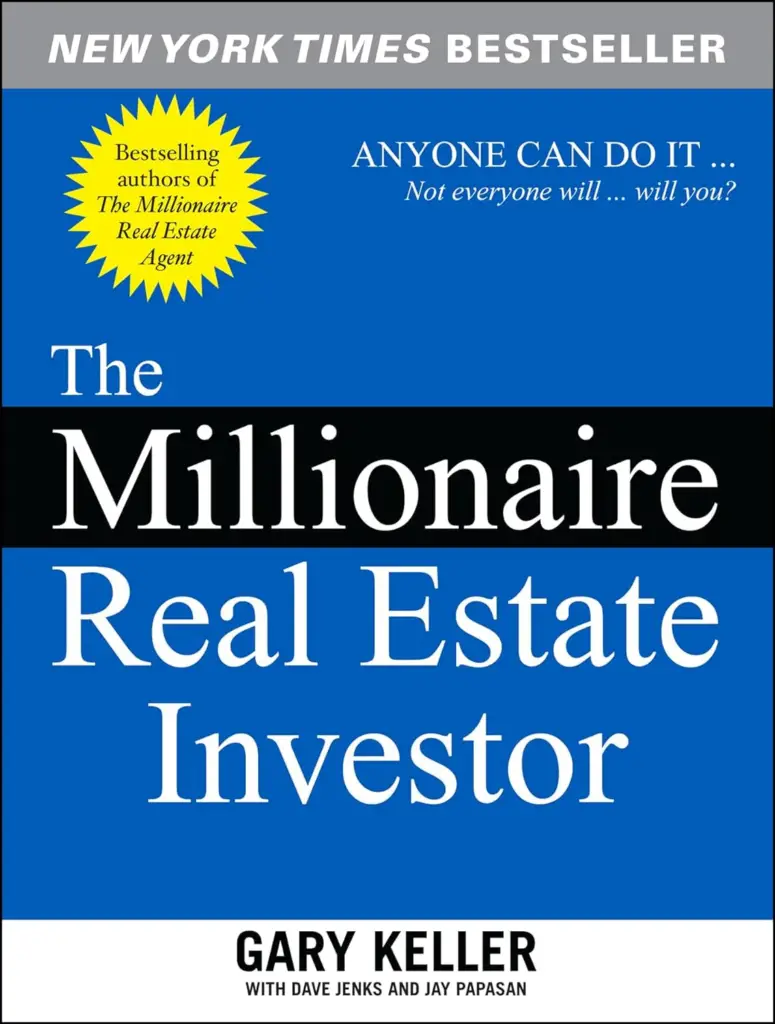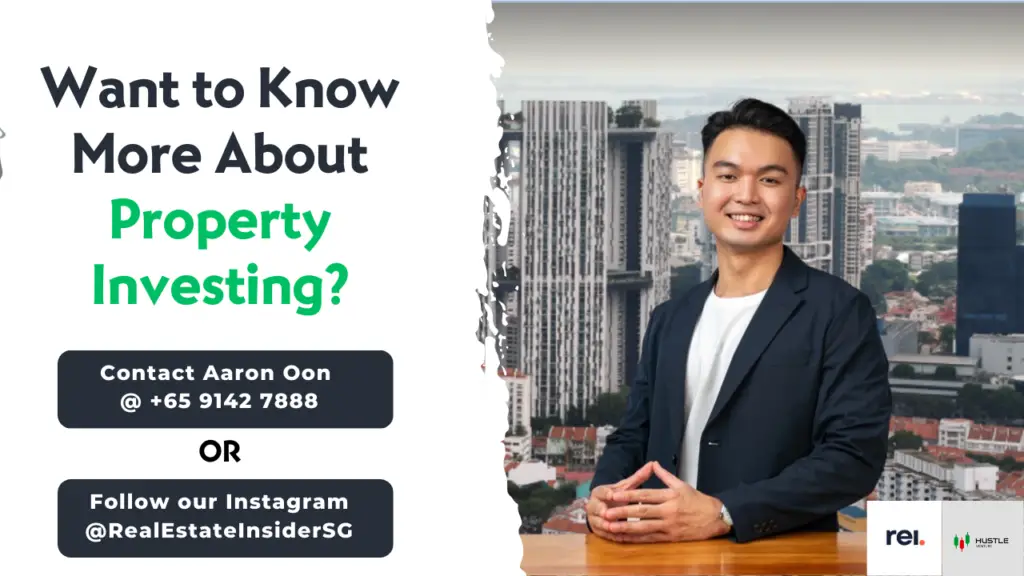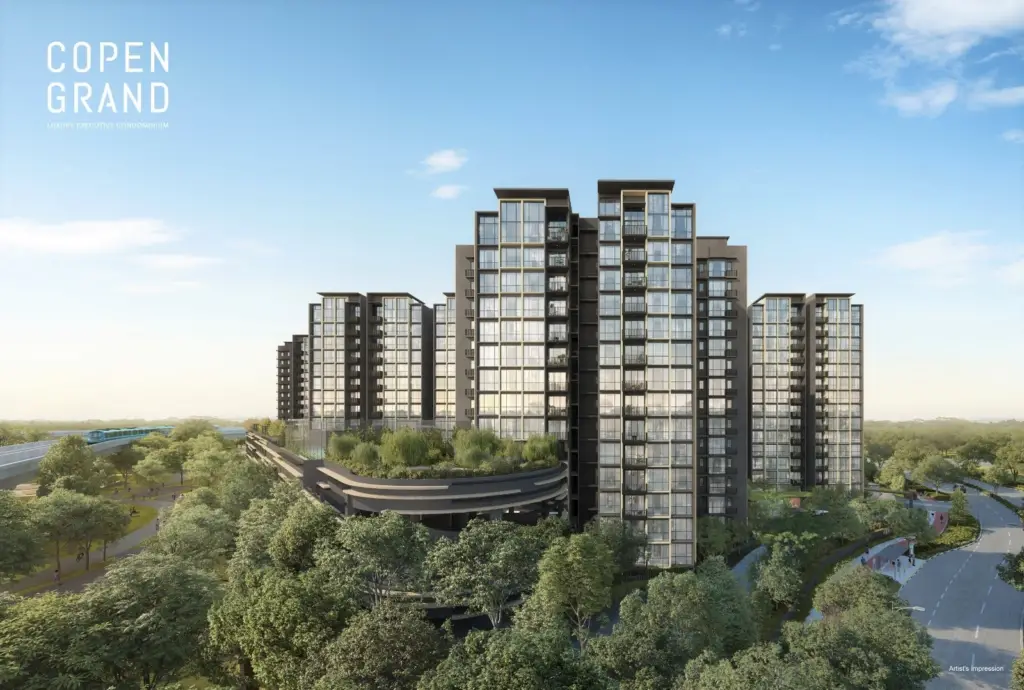An Executive Condominium (EC) in Singapore is a unique housing option that blends the characteristics of public and private housing. It provides an alternative for those earning above the income ceiling for public housing but finding private condominiums financially out of reach.
ECs come with certain restrictions on ownership and resale but offer a pathway to private property ownership over time. And based on historical data, executive condos have one of the best capital appreciation returns in Singapore.
This article explores the nuances of ECs, their financial implications, benefits, and how to navigate the market.
Key Takeaways
- Executive Condos (ECs) are a hybrid housing type in Singapore, designed for middle-income earners who exceed the public housing income ceiling.
- ECs have initial ownership and resale restrictions, but transition to private housing status after 10 years, lifting these restrictions.
- Buying an EC can be more cost-effective than private condos, with prices up to 25% lower, and buyers may be eligible for CPF housing grants.
- ECs offer a range of facilities and lifestyle advantages similar to private condos, with investment potential after full privatisation.
- The Singapore government releases land for ECs through the Government Land Sales (GLS) programme, with locations often outside the central region.
What Is An Executive Condo

Executive Condominiums (ECs) represent a unique class of housing in Singapore, designed to cater to the aspirations and needs of the ‘sandwich’ class—those who surpass the income ceiling for public housing but find private condominiums financially out of reach.
ECs serve as a bridge between the two, offering a blend of public housing affordability and private housing amenities.
- Eligibility: To purchase an EC, buyers must meet certain criteria set by the Housing & Development Board (HDB).
- Initial Restrictions: ECs come with initial ownership and resale restrictions, typically for the first 5 years, known as the Minimum Occupation Period (MOP).
- Privatisation: After 10 years, ECs fully privatise, allowing owners to sell to foreigners and corporate entities.
ECs are not just a housing solution but also a strategic investment choice. They often appreciate in value over time, especially after full privatisation, making them an attractive option for long-term investment.
While ECs offer a more affordable entry point into the private property market, they also come with certain conditions post-purchase. For instance, buyers of ECs may have previously owned a subsidised housing unit, such as a flat from HDB or an EC unit from a property developer. Understanding these nuances is crucial for prospective buyers navigating the real estate landscape.
Ownership and Resale Restrictions
Executive Condominiums (ECs) come with specific ownership and resale restrictions that are important for potential buyers to understand. Initially, ECs can only be sold to eligible buyers who meet certain criteria, such as being a Singaporean citizen or forming a family nucleus under schemes like the Public Scheme, Fiancé Fiancée scheme, or Orphans Scheme.
During the first 5 years, known as the Minimum Occupation Period (MOP), owners are not allowed to rent out the entire unit or sell it on the open market. After this period, while the EC can be sold to Singaporeans or Permanent Residents, it’s only after the 10th year from the date of the Temporary Occupation Permit that the EC is fully privatized.
At this point, the pool of potential buyers expands significantly, including foreigners, which can lead to potential gains from a more diverse market.
The ownership of an EC is also subject to limitations if the buyer already owns other properties, and there are caps on the number of subsidized housing units a Singaporean household can purchase. Singles, notably, are not eligible for CPF Housing Grants when purchasing a resale EC.

Want to take it a step further and level up your knowledge about real estate and possibly guide people into making good property investments?
“The Millionaire Real Estate Investor” is a New York Times best-selling book and has been around for quite some time now for its universal knowledge in real estate investing applications.
Interested to know more?
The Transition from Public to Private Housing
Executive Condominiums (ECs) offer a unique pathway for homeownership in Singapore, blending aspects of public and private housing. After a decade, ECs shed their public housing status, becoming fully privatised properties. This transition opens the market to a broader audience, including foreign buyers, which can potentially increase the unit’s value.
Meeting the Minimum Occupation Period (MOP) of five years is essential for owners who wish to sell their EC. During this time, the property can only be sold to Singaporeans or Permanent Residents.
After the MOP, and until the 10-year mark, the pool of potential buyers widens but remains limited to these groups. Once privatised, the restrictions are lifted, and the property can be sold or rented to anyone, including foreigners.
The privatisation of ECs marks a significant milestone, allowing owners to leverage their investment in the broader real estate market.
For many, the transition from public to private housing through ECs is an attractive option due to the affordable entry to the private property market. With private properties available for S$700,000 or less, and various co-borrowing and payment schemes, ownership becomes more accessible.
This affordability, coupled with the potential for investment after privatisation, makes ECs a compelling choice for those looking to upgrade from an HDB flat to a condo.
Financial Considerations for Prospective EC Buyers

Comparing ECs with Private and HDB Properties
When deciding on a first home, Singaporeans often find themselves weighing the pros and cons of Executive Condominiums (ECs) against private condos and HDB properties. ECs present a middle ground, offering condo amenities without the private condo price tag, and the potential for high capital appreciation.
Unlike private condos, there’s no income ceiling for ECs, making them accessible to a wider range of buyers. However, ECs come with a 5-year Minimum Occupation Period (MOP), during which owners cannot sell or rent out the entire unit.
In contrast, private condos offer immediate private housing status with no MOP, allowing owners to rent or sell at any time. They are more expensive than ECs and are not eligible for CPF housing grants, which can be a significant factor for many buyers. HDB properties, on the other hand, provide full lease tenure and a sense of community but may lack the amenities and lifestyle advantages of condos.
The choice between an EC, a private condo, or an HDB property hinges on individual financial situations, family needs, and long-term investment goals.
Here’s a quick comparison to help prospective buyers understand the differences:
| Property Type | Price Range | Ownership Status | Eligibility Criteria | Resale Potential |
|---|---|---|---|---|
| EC | Moderate | Public (10 yrs), Private thereafter | Income ceiling, MOP | High after privatisation |
| Private Condo | High | Private | No restrictions | Depends on market conditions |
| HDB | Lower | Public | Various criteria | Varies with location and amenities |
CPF Housing Grants and Affordability
For many prospective buyers, CPF Housing Grants significantly enhance the affordability of Executive Condominiums (ECs). These grants are designed to assist first-time homebuyers and are available in various forms, depending on the buyer’s citizenship status and household income.
The Family Grant and the Half-Housing Grant are two primary subsidies offered to eligible buyers. The Family Grant provides up to $30,000 for Singapore Citizen (SC) households with an average gross monthly income of $10,000 or lower. Mixed households, comprising a Singapore Citizen and a Permanent Resident (SPR), can receive $20,000 under the same income criteria. The Half-Housing Grant offers $15,000 for SC/SC households and $10,000 for SC/SPR households, catering to those who may not qualify for the full grant amount.
It’s important to note that the CPF Housing Grant comes with certain conditions. For instance, recipients of the grant who later decide to purchase another subsidized flat or an EC from a property developer are subject to a resale levy. This levy, which can be as high as S$55,000, is intended to moderate the housing subsidy for the buyer’s second subsidized property, ensuring equitable distribution of housing subsidies among home buyers.
| Household Type | Grant Amount | Income Ceiling |
|---|---|---|
| SC/SC | $30,000 | $10,000 |
| SC/SPR | $20,000 | $10,000 |
| SC/SC (Half) | $15,000 | $10,000 |
| SC/SPR (Half) | $10,000 | $10,000 |
While the CPF Housing Grant can make ECs more accessible, it’s crucial for buyers to understand the long-term financial implications, including the resale levy, before making a commitment.
Price Trends and Market Analysis
When considering the purchase of an executive condominium (EC), it’s crucial to analyze the price trends and market dynamics. The property market trends focus on entry prices, potential growth, and investments in areas like Jurong Lake District.
Prospective buyers should be aware that the price increase of new EC units has outpaced the prices of the rest of the residential market, indicating a strong demand for this housing type.
Recent data highlights significant movements in the resale market for condos. For instance:
| Year | Average Resale Price (psf) |
|---|---|
| 2022 | $1,516 |
| 2023 | $1,625 |
This table shows a notable increase of 7.2% year-on-year, suggesting a healthy appreciation in value for condo owners. Moreover, the first EC launch of 2024 witnessed 53% of its units sold swiftly, reinforcing the attractiveness of ECs as an investment.
It’s essential for buyers to understand that while ECs offer a more affordable entry point compared to private condominiums, they also hold the potential for significant capital appreciation after the initial Minimum Occupation Period (MOP) and upon reaching full privatisation status.
Lastly, it’s advisable to consult with real estate experts who can provide deeper insights into the market. For example, a guide on income requirements to buy a condo in Singapore can be invaluable for understanding eligibility, income sources, and strategies to meet loan criteria.
Aaron Oon is a Senior Associate Director at Propnex and Founder of Real Estate Insider. A consistent Top Producer in the competitive world of real estate, Armed with a Finance degree from NUS, Aaron is more than just a real estate agent; he’s a strategic thinker and a creative problem solver.
If you are looking to invest in a property here in Singapore or would like to know more about Singapore’s property market. Be sure to reach out through the Calendy video link below:

Benefits of Choosing an Executive Condo

Cost-Effectiveness Compared to Private Condos
Executive Condominiums (ECs) present a compelling cost-effective alternative to private condominiums, especially for those who meet the eligibility criteria. With the price of suburban private condos reaching new highs, ECs offer a more accessible entry point into the condo market.
A recent DBS Group Research report highlighted that ECs are priced at up to a 25% discount compared to private properties, primarily due to income limits and tighter affordability ratios imposed on buyers.
ECs not only provide a more affordable option but also come with the added benefit of eligibility for CPF housing grants, which can significantly reduce the upfront costs for first-time buyers.
The table below illustrates the stark contrast in pricing between new EC units and comparable new private condo units, reflecting the healthy appetite for new EC homes due to their affordability:
| Property Type | Average Price (S$) |
|---|---|
| New EC Unit | 800,000 – 1,430,000 |
| New Private Condo Unit | 2,300,000 – 2,900,000 |
For those considering the resale market, a 2-bedroom EC can be expected to cost between $800,000 to $1,430,000, which is a significant saving compared to new private condos forecasted to cost between $2,300 to $2,900 psf on average by 2030. This price advantage, coupled with the transition to private property status after 10 years, makes ECs an attractive long-term investment.
Condo Facilities and Lifestyle Advantages
Executive condos (ECs) offer a unique blend of affordability and luxury, providing a range of condo facilities that enhance the lifestyle of its residents. These facilities often rival those found in private condominiums, allowing EC owners to enjoy a premium living experience without the hefty price tag.
- Swimming pools
- Gyms
- Function rooms
- BBQ pits
- Children’s playgrounds
The lifestyle advantages of ECs extend beyond the physical amenities. Residents benefit from a sense of community and security, often found in private developments. The high rental demand in areas with ECs also suggests a vibrant community and a desirable living environment.
Executive condos strike a balance between cost and quality, making them an attractive option for those who seek a comfortable and upscale living space without overextending their finances.
It’s important to note that while ECs are initially subject to certain restrictions, they transition into fully private properties after 10 years, potentially increasing their value and investment appeal. This transition allows owners to tap into the private resale market, often at a profit due to the initial lower purchase price compared to private condos.
Investment Potential After Privatisation
Executive Condominiums (ECs) offer a unique investment opportunity, especially after they transition to private property status post the 10-year mark. Owners can expect a potential increase in property value, often making ECs a lucrative option for long-term investment. The privatisation of ECs allows owners to sell or rent their units to a wider market, including foreigners, which can lead to significant financial gains.
The allure of ECs as an investment lies in their initial affordability and the prospect of capital appreciation. After the Minimum Occupation Period (MOP), owners gain the flexibility to sell in the open market, tapping into a broader audience and possibly fetching higher prices.
Here are some key points to consider for EC investors:
- Facility and property management services offered can impact the desirability and value of the EC.
- Monitoring EC MOP dates is crucial for timing the market effectively.
- The shophouse market in Singapore also shows potential for appreciation, which may influence the EC market indirectly.
- Financing and operating costs are important considerations for any real estate investment, including ECs.
Navigating the EC Market in Singapore

Current and Upcoming EC Projects
The landscape of Executive Condominiums (ECs) in Singapore is dynamic, with several exciting projects lined up for prospective buyers. Here’s a snapshot of the EC market as we look towards 2024:
- North Gaia: Nestled in District 27, this EC is notable for its scenic views and convenient amenities.
- Altura EC: Positioned in Bukit Batok West Avenue 8, Altura is set to be the sole EC launch in 2023, offering easy access to public transport.
- Plantation Close EC: With an estimated launch in January 2024, this development is one to watch for its strategic location.
- Tenet EC: Located in Tampines, this EC is part of the buzz in one of Singapore’s most sought-after residential areas.
As the EC market continues to grow, these projects represent a mix of strategic locations and lifestyle benefits, catering to a diverse range of homebuyers.
Potential EC buyers need to stay informed about the latest developments and launches. The upcoming ECs not only promise modern living spaces but also the potential for significant investment returns after the Minimum Occupation Period (MOP).
Location and Accessibility Considerations
When considering an Executive Condo (EC), location and accessibility are paramount. Prospective buyers should evaluate the proximity to public transport, such as MRT stations and bus stops, as well as the ease of access to major expressways. For instance, some ECs offer a short walk to an MRT station, while others might require a bus ride to connect to the wider transit system.
Connectivity to schools, shopping centers, and other amenities also plays a crucial role in the decision-making process. A well-located EC not only provides convenience but can also have a significant impact on future property values. For example, developments in the North-East region of Singapore are expected to see an increase in value due to regional development plans.
It is essential for buyers to not only focus on the immediate benefits but also consider long-term factors such as the potential for appreciation in property value and the development of surrounding infrastructure.
Below is a list of considerations for EC location and accessibility:
- Proximity to MRT and LRT stations
- Accessibility to major expressways like TPE and CTE
- Distance to educational institutions and healthcare facilities
- Availability of shopping and dining options nearby
- Future regional development plans that may affect property values
Understanding the Government Land Sales (GLS) Programme
The Government Land Sales (GLS) Programme plays a pivotal role in shaping the landscape of executive condominiums (ECs) in Singapore. Developers acquire state land through competitive bidding, ensuring a transparent allocation of resources that aligns with the nation’s urban planning goals. The GLS Programme is divided into the Confirmed List and the Reserve List, with the former comprising sites that are released according to schedule and the latter including sites that are launched for tender only when a developer commits to a minimum bid price.
The Confirmed List supply of private housing, including ECs, has seen an increase, indicating the government’s proactive approach to managing housing supply. For instance, the supply was ramped up from 5,160 units in the second half of 2023 to 5,450 units in the first half of 2024. This adjustment reflects the government’s commitment to ensuring a stable property market and preventing price surges.
The GLS Programme not only facilitates the availability of land for development but also contributes significantly to the government’s revenue. It is a critical component in maintaining a sustainable and vibrant property market in Singapore.
Developers often seek opportunities to land bank in the Core Central Region (CCR) through the GLS Programme, which can lead to the development of premium EC projects. The programme’s influence extends beyond the availability of land; it also impacts property values in surrounding areas, as seen with top schools like ACS Primary enhancing the appeal of nearby ECs.
Looking to invest in a property?
Executive Condominiums (ECs) in Singapore offer affordability, with prices significantly lower than private condos, and the potential for full privatization after 10 years. With eligibility for CPF housing grants and a set percentage reserved for first-time buyers, ECs are an attractive choice for those who exceed the income ceiling for BTO flats but find private properties out of reach.
Despite being located further from the CBD, ECs provide a comfortable and cost-effective path to homeownership, especially for upgraders and families in need of larger units. As the demand for ECs continues to grow, they remain a vital part of Singapore’s diverse housing landscape.
Aaron Oon is a Senior Associate Director at Propnex and Founder of Real Estate Insider. A consistent Top Producer in the competitive world of real estate, Armed with a Finance degree from NUS, Aaron is more than just a real estate agent; he’s a strategic thinker and a creative problem solver.
If you are looking to invest in a property here in Singapore or would like to know more about Singapore’s property market. Be sure to reach out through the Calendy video link below:

Frequently Asked Questions
What is an Executive Condominium (EC)?
An Executive Condominium (EC) is a type of housing in Singapore that blends elements of private and public housing. It is designed for the ‘sandwich’ class of buyers who exceed the income ceiling for public housing but find private properties too expensive. ECs come with initial ownership and resale restrictions but transition to private property status after 10 years.
What are the ownership and resale restrictions for ECs?
During the first five years, ECs cannot be sold or rented out entirely. From the 6th to the 10th year, only Singaporeans or Permanent Residents can buy them, with no family nucleus requirements. After 10 years, ECs become fully privatized, and there are no restrictions on ownership or resale.
How do ECs compare to private and HDB properties financially?
ECs are typically about 25% cheaper than private condominiums due to government subsidies and are aimed at helping middle-income families afford larger living spaces. They are more expensive than HDB flats but offer more amenities and the potential to privatize, which can lead to an increase in value.
Can buyers use CPF Housing Grants to purchase ECs?
Yes, eligible buyers can apply for CPF Housing Grants to offset the cost of purchasing an EC. These grants are available to first-time buyers and can significantly reduce the financial burden of acquiring an EC.
What are the benefits of choosing an EC over a private condo?
ECs offer a cost-effective alternative to private condos, often at a discount of up to 25%. They provide similar facilities and lifestyle advantages, and after 10 years, they become private property, potentially offering good investment returns upon privatization.
How can I find out about new and upcoming EC projects in Singapore?
Information about new and upcoming EC projects can be found through the Urban Redevelopment Authority (URA) under the Government Land Sales (GLS) programme, real estate listings, and property developers’ announcements. Typically, one to two EC projects are launched annually to meet demand.




